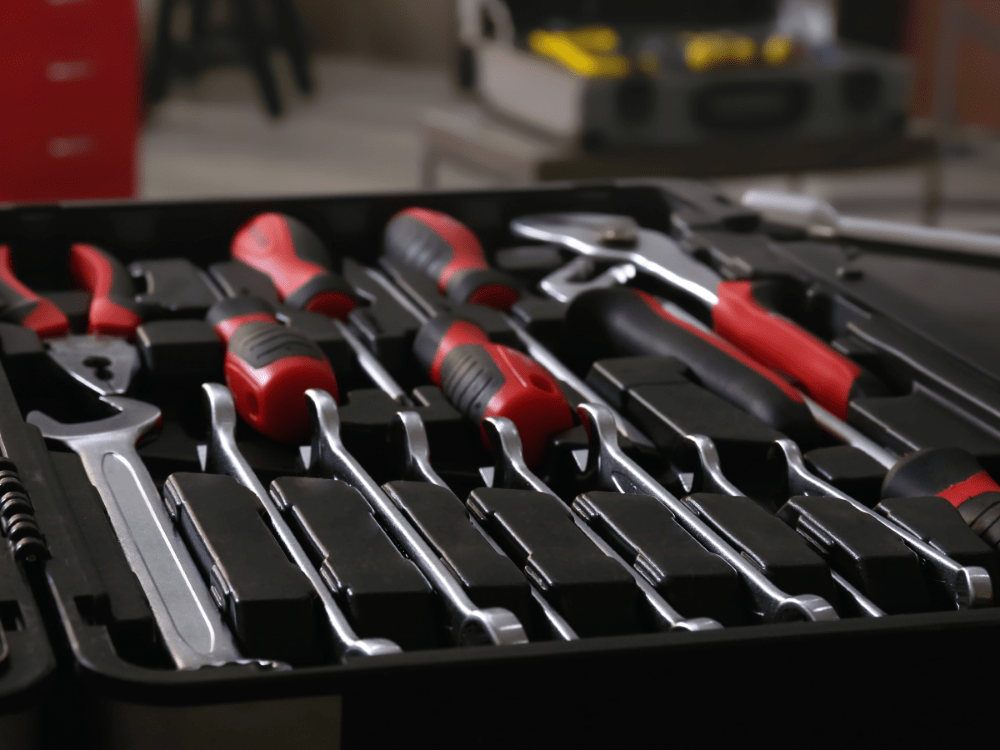As a landlord, managing rental properties isn’t just about collecting rent. It also involves maintaining the property to ensure its longevity and resident satisfaction. But the costs associated with repairs and maintenance can often catch landlords off guard if not properly planned for.
To keep any rental property profitable, you must stay on budget and cash flow positive. But how do you do this if you have no sense of how much repairs and maintenance will cost you?
Lucky for you, we are no strangers to this dilemma and have helped countless landlords prepare and plan for profitability!
In this blog, we’ll explore the intricacies of budgeting for rental property repairs and maintenance, providing insights and strategies to help landlords stay financially prepared.
Understanding the Scope of Repairs and Maintenance

Before we dive into budgeting strategies, let’s review the difference between repairs and maintenance. Repairs address specific issues that arise unexpectedly, while maintenance involves routine upkeep to prevent larger problems from occurring. As a landlord, you have legal obligations to maintain your property, ensuring it meets health and safety standards. It’s also in your best interest to address repairs quickly and thoroughly as residents are likely to rate their rental experience with you much more positively if you do.
Table of Contents
Examples of Common Repairs:
- Plumbing issues such as clogged drains or malfunctioning garbage disposals
- Electrical problems such as malfunctioning outlets or switches
- Appliance repairs such as broken dishwashers or dryers
- Lock and key issues including lost keys that require the unit to be rekeyed
Examples of Routine Maintenance:
- HVAC system maintenance, which consists of regular cleaning and replacement of air filters, seasonal inspection of heating and cooling systems, and ensuring all moving parts are in working order
- Gutter and roof maintenance, which includes cleaning of gutters and downspouts, inspecting the roof for damage, and clearing debris from roof valleys to ensure proper drainage
- Landscaping and lawn care, which can include mowing, edging, and trimming lawn areas, pruning trees and shrubs, and weed control
Depending on your rental agreement, residents may be responsible for some of these common types of repairs or maintenance, while the responsibility may fall on you as the landlord to address the others. It’s important to be clear about what repairs and maintenance are the resident’s responsibility and how they should go about requesting help.
And remember, this list is just a start. The full list is long so it’s best to plan and be prepared for any scenario!
Setting Up a Repairs and Maintenance Budget
The best way to be prepared should your property need repair or maintenance is by creating a budget.
A good place to start is by assessing the current condition of your rental property and taking note of all routine maintenance tasks as well as possible repairs you can foresee. For example, if the dishwasher in your rental property is on the older side and there is the possibility it breaks during a resident’s lease, budget for this repair to prevent getting caught off guard.
It’s best practice to allocate the approximate amount for all foreseeable routine maintenance tasks, such as HVAC servicing or lawn care, to ensure you are ready to keep your property in fine working order.
Refer back to the list below that highlights many of the necessary routine maintenance tasks when assessing your rental property and preparing a budget.
Exterior Maintenance
- Inspect and clean gutters, downspouts, and roof
- Inspect and repair fences, gates, and outdoor structures
- Inspect and clean HVAC units
- Inspect and repair exterior lighting/electrical
- Inspect and repair hazardous cracks or damage in sidewalks, porches, or patios
- Inspect and clean the fireplace and chimney
- Inspect and repair damaged, loose, or missing siding or trim
Interior Maintenance
- Test and service the HVAC system
- Test and service all smoke detectors and carbon monoxide detectors
- Inspect and clean exhaust fans
- Test and service the furnace
Landscaping and Lawn Care
- Prune trees and shrubs before growing season begins
- Test and service sprinkler system before use
- Prepare landscaping for winter by mulching and pruning
- Regular mowing, fertilizing, and aerating
Strategies to Minimize Repairs and Maintenance Costs
Prevention is often more cost-effective than cure when it comes to property maintenance.
Regular inspections and preventive maintenance can help identify issues early on, reducing the likelihood of costly repairs down the line. It’s also in your best interest to educate and regularly remind residents about their responsibilities when it comes to repairs and maintenance they are expected to manage on their own. Finally, building relationships with reliable contractors can help streamline the maintenance process and minimize costs, especially if you own multiple properties and use the same contractor for each one.
If you don’t want to manage it all on your own a professional property management company could help. While you will pay for their services, these companies often have professional, in-house teams or ins with vetted contractors. It could certainly save you money (and a few headaches) down the road.
Creating a Contingency Fund
One of the best ways to prepare for the unexpected is to set up a contingency fund to handle unforeseen repair expenses. Once you have created an informed budget, you can determine the size of your contingency fund and start regularly contributing to it.
It’s best to treat this money as untouchable, and not dip into it for non-essential expenses. In this way, you have a solid safety net should a costly repair pop up or multiple routine maintenance services come due at one time. You never want to be caught unprepared and without enough money to cover these necessary expenses or you can risk not just the profitability of your property but also the health and wellbeing of your residents.
Tracking and Monitoring Expenses
Once you have a resident in place and repair and maintenance expenses start to occur, it’s essential to implement a tracking system so you can review and refine your budget. Whether it’s through spreadsheets or property management software, you should diligently record all expenses and regularly review your budget to identify any areas where adjustments may be needed. With each lease term, your budget will become increasingly accurate and can turn into an invaluable tool for ensuring profitability.
Legal and Tax Considerations
When budgeting for repairs and maintenance at rental properties, you as a landlord need to consider both the legal and tax implications.
Legally, you are typically obligated to maintain your property so it remains in a habitable condition, adhering to local housing codes and regulations. Failure to fulfill these obligations can lead to fines, legal disputes, or even eviction lawsuits. Certain repairs may also be required by law, such as addressing health and safety hazards. It’s best practice to consult with a legal professional to understand all of your responsibilities as a landlord.
From a tax perspective, you can often deduct repair and maintenance expenses as operating expenses, reducing your taxable income. However, it’s essential to distinguish between repairs (deductible) and improvements (capitalized and depreciated), as well as to keep detailed records of all expenses for tax reporting purposes. Consulting with a tax professional or real estate attorney can give you valuable guidance in navigating legal and tax considerations effectively.
Final Thoughts: Spending on Repairs and Maintenance
Budgeting for repairs and maintenance is a critical aspect of successful property management for landlords. By understanding the scope of repairs, setting up a comprehensive budget, implementing cost-saving strategies, creating a contingency fund, and staying informed about legal and tax considerations, you can ensure your property remains well-maintained while keeping costs under control.
If you think enlisting the help of a seasoned property management company would help reduce your stress and maximize your profits, look no further than Evernest. We help landlords across the country navigate the challenges of property maintenance with confidence and financial stability and we would love to help you too!


